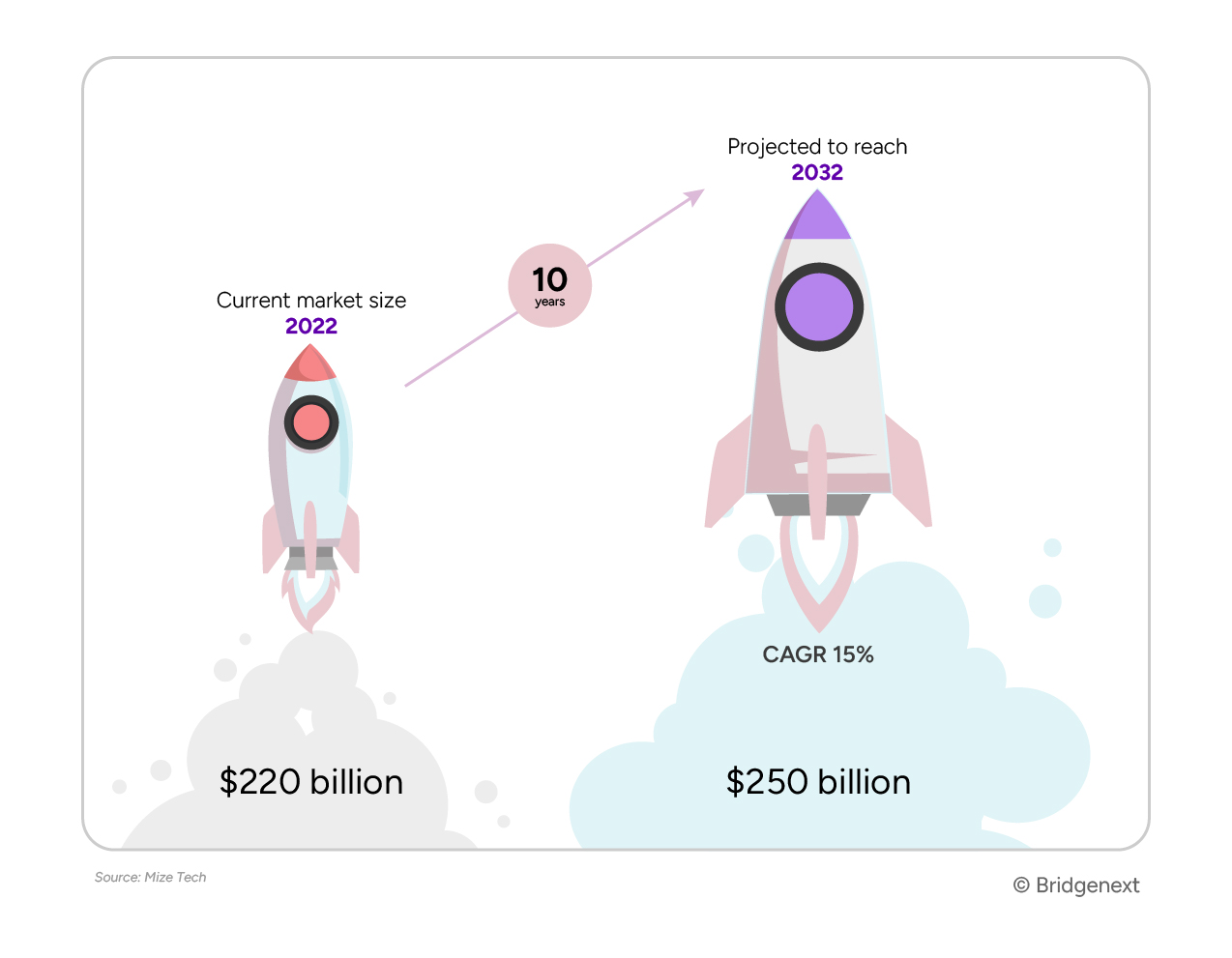11.12.24 By Bridgenext Think Tank

In today’s rapidly evolving travel and hospitality sector, customer experience (CX) has become the most significant differentiator between brands. Travelers now expect more than convenience—they seek personalized, seamless, and engaging interactions throughout their journey. This is where predictive personalization steps in as a game-changer.
71% of consumers expect personalized experiences, and 76% feel frustrated when they don’t receive them. This highlights the importance of personalization in meeting customer expectations.
– McKinsey & Company
Predictive personalization uses database analytics powered by AI and machine learning to deliver highly personalized experiences based on forecasting a customer’s future needs, preferences, and behaviors. It involves analyzing historical data and patterns to predict what an individual wants accurately.
By leveraging predictive personalization, hotels, airlines, and other travel and hospitality platforms can anticipate guests’ preferences, behaviors, and needs long before they are expressed. This allows tailored offers, dynamic recommendations, and hyper-relevant guest engagements that transform ordinary customer interactions into extraordinary ones. Whether it’s predicting a traveler’s preferred room type, offering custom vacation packages, or delivering real-time, on-site recommendations, personalized marketing.
This leap in guest experience is not accidental; it is the direct result of integrating big data and predictive modeling into the core operations of the travel and hospitality industry. Analyzing real time data enables these sectors to understand current trends and predict future customer behavior with remarkable accuracy. This client journey mapping fuels the highly personalized experiences that today’s travelers expect.
Earlier predictive analytics were most commonly associated with industries like Fintech and IT. However, it has also recently significantly improved the travel and hospitality sector. The data analytics in the travel and tourism market was valued at $220 billion in 2022 and is expected to reach $350 billion by 2032, with a CAGR of 15%. This shift underscores the increasing importance of personalization, as predictive analytics enables AI in the travel and hospitality industry to tailor experiences to individual preferences and behaviors, marking a new era of personalized service reshaping the industry.

Personalized experience can be a pivotal strategy for standing out in competitive markets. Let’s explore the significance of customer experience and personalized marketing strategy in the travel and hospitality sector.
Personalized experiences in travel and hospitality are now necessary, with predictive analytics playing a key role. Analyzing real-time data allows businesses to offer hyper-personalized services that resonate with experience-driven travelers.
Today’s traveler is more informed, discerning, and tech-savvy, expecting seamless and customized experiences. Understanding their evolving needs is crucial for delivering value. According to Accenture, 91% of consumers favor brands that offer personalized recommendations, making it essential for travel companies to understand these evolving needs deeply. Predictive analytics provide the keys to helping businesses deliver relevant, seamless experiences that keep travelers coming back.
Personalization transforms customer engagement, setting leaders apart in the highly competitive T&H landscape by driving loyalty and repeat business. McKinsey reports that companies that excel in personalization achieve 40% more revenue than their competitors. Personalized experiences—from tailored itineraries to exclusive offers—drive customer loyalty, turning one-time visitors into repeat clients.
Personalized experiences increase guest experiences and significantly boost revenue through improved retention rates, up-sell opportunities, and enhanced CLV. Research by Epsilon found that 80% of customers are more likely to engage with businesses offering personalized services. When personalization is woven into the customer journey, companies see up to a 20% increase in revenue. By focusing on individual preferences, businesses unlock up-sell opportunities, foster repeat bookings, and elevate customer lifetime value.
As AI continues to advance in the travel and hospitality industry and customer expectations increase, the future of predictive personalization looks promising. By harnessing the power of technology and data, businesses can anticipate customer needs and preferences, ensuring each interaction is personalized and memorable. Here’s how it helps:
With cutting-edge tools, businesses can anticipate and fulfill customer needs like never before, crafting uniquely personal and unforgettable journeys. Dive into how these AI tools redefine travel and hospitality, turning every trip into a memorable experience.
| Tool | Description | Use Case |
|---|---|---|
| Snowflake Data Cloud | Securely centralizes data to enhance predictive marketing analytics | Boosts travel marketing campaigns with enriched data from third-party sources |
| Salesforce Einstein | Provides AI insights and recommendations for personalization | Tailors’ hotel guest experiences by predicting preferences |
| Amadeus | Offers personalized travel solutions and dynamic pricing | Provides airlines with tailored offers |
| Revinate | Offers a CRM with predictive analytics for guest engagement | Sends custom promotions to resort guests based on their history |
| Adobe Sensei | Powers AI-driven personalization across digital channels | Powers real-time personalized content and offers on travel sites |
| Sabre Red 360 | Provides data-driven insights for travel agencies | Crafts custom itineraries using customer insights |
| IBM Watson | Offers deep analysis and personalization capabilities | Optimizes cruise experiences by predicting passenger preferences |
Handling sensitive data is a big part of predictive analytics in the travel industry. This data can include personal information and details about how people like to travel. To keep this information safe from unauthorized access or breaches, it’s crucial to have strong security measures and use data encryption.
In addition, travel platforms must adhere to regulations like GDPR or CCPA. To maintain customer trust, platforms must obtain explicit permission and be open about data use. This transparency is critical to ensuring customers feel comfortable and confident about their information being handled correctly.
Being transparent about how you are using customer data is essential. Customers should know exactly what’s happening with their information to improve their experience. Giving customers choices, like letting them decide how much personalization they want, is an excellent way to respect their privacy.
Furthermore, using methods such as anonymization and data aggregation helps protect privacy while personalizing things. Anonymization means removing details that could identify someone directly, while data aggregation groups data for analysis. These techniques strike a balance: they offer personalized experience without giving away anyone’s private information.
Maintaining the accuracy and reliability of real-time data poses a challenge, especially in dynamic environments like travel. Inconsistencies in data collection can impact on the effectiveness of predictive models and lead to suboptimal decisions.
Machine learning models require constant fine-tuning to adapt to evolving patterns and dynamics in travel data. This means you’ll need to invest in data science expertise, infrastructure, and resources to ensure the accuracy and relevance of predictive models.
Let’s look at how companies benefited by leveraging predictive analytics.
Hyatt, one of the largest hospitality companies, handles hundreds of thousands of monthly calls. They implemented an intelligent virtual assistant to enhance the customer experience beyond what human agents could provide — the assistant with automated tasks like making new reservations, transferring calls, and confirming or canceling.
Qantas invested in a real-time data analytics solution to improve its schedule recovery and deliver top-tier travel experiences. This allowed Qantas to assess operational costs and reduce flight delays quickly. Qantas personalized its recovery solutions with predictive analytics, optimizing routes and services based on passenger patterns and preferences. The improved accuracy minimized disruptions and helped Qantas cater to individual travel needs, enhancing the customer experience.
As sustainability becomes a priority for travelers and businesses alike, predictive analytics can forecast eco-friendly travel trends and help companies reduce their environmental footprint. By anticipating demand for sustainable services, businesses can tailor their offerings, promoting responsible travel options that align with evolving customer values.
Predictive analytics will continue to revolutionize customer experiences by creating hyper-personalized journeys. The ability to predict preferences, suggest personalized itineraries, and offer real-time recommendations will enable companies to build deeper connections with their customers, elevating satisfaction and loyalty.
From anticipating traveler preferences to optimizing operations and delivering hyper-personalized experiences, predictive insights empower travel companies to meet customer expectations in real-time. However, to fully unlock the potential of predictive analytics, your data must first be organized and primed for analysis. Here’s how travel and hospitality businesses can get started:
Align predictive analytics with clear objectives, such as boosting customer loyalty, enhancing guest experiences, or optimizing pricing. Whether you aim to predict booking trends or personalize marketing, defining your goals ensures value-driven insights.
Audit all relevant data sources—customer bookings, loyalty programs, web interactions, and occupancy rates. Evaluate the data’s quality and identify gaps, such as missing guest feedback or incomplete histories, that could impact your predictive efforts.
Data from different systems (CRM, booking engines) must be cleansed and standardized. Remove duplicates, correct errors, and ensure platform consistency to create a solid foundation for predictive models.
Ensure data privacy, security, and regulatory compliance (e.g., GDPR) through strong governance policies. These build trust with customers while ensuring responsible data use.
Invest in scalable tools that can transform travel data into actionable insights for forecasting demand or personalizing offers. Having the right team with data science and travel expertise will enhance your predictive analytics success.
Bridgenext can help you organize your data and empower you to turn it into actionable insights with predictive personalization. With Bridgenext’s innovative technology solutions, you can anticipate customer needs, deliver tailored experience, and stay ahead in a competitive market. Unlock the future of travel and hospitality with advanced analytics and elevate your customer experience today.
Discover how our specialized solutions can enhance customer experience and streamline your operations. Connect with our team to transform your business!